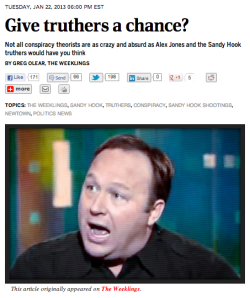Anyone who has been reading Salon.com the past couple of weeks will have noticed its comprehensive coverage of the tiny, but growing Sandy Hook conspiracy movement. Salon writer Alex Seitz-Wald has been out in front in debunking the still fringe conspiracy theories that the government orchestrated the elementary school massacre in order to seize the nation’s automatic weapons. Some good questions are being asked about whether or not debunking these conspiracy theories in their nascent stages before they have built any mainstream support actually does more harm than good, but Seitz-Wald’s coverage has been excellent.
Yesterday, though, the site seemed to have departed from its conspiracy theory skepticism, publishing an article titled “Give truthers a chance?” The story from a Salon partner site called the Weeklings argued that the 9/11 conspiracy theory should not be discounted in the same group as Sandy Hook trutherism.* “[U]nlike with Sandy Hook, 9/11 conspiracy theories flow from a scientific fact: whatever the 9/11 Commission Report might claim, fire generated by burning jet fuel is not hot enough to melt steel,” author Greg Olear wrote.
In 2011, I wrote a history of the 9/11 conspiracy movement for Slate, and I can tell you that, no, this is not scientific fact, nor any other kind of fact. Salon feels the same way and has since pulled the article from its site and is planning on issuing a public retraction. “I’m pretty horrified,” Salon editor Kerry Lauerman told me about the publication of the piece. Lauerman hadn’t seen the article before I emailed him and he started seeing various critical tweets about it, and he says that it “went up without enough eyeballs.” The article was selected from the partner site because a junior editor saw that it was connected to the Sandy Hook truther coverage and got a little “overexcited” about it, Lauerman says.
“It was an unfortunate lapse, but this is thankfully a really very rare event,” he added. Salon has 30 or so partner sites with one editor vetting all of those stories, some with more scrutiny than others depending on the reliability of the publication. “I’m sure we’re going to take a step back and make sure we’re following the appropriate procedures so it doesn’t happen again,” Lauerman told me.
The site doesn’t usually take things down completely, preferring to append a correction to stories rather than remove them entirely, but Lauerman felt that keeping the story up in this instance did more harm than good.
As online media sites—Slate included—continue the push for greater volumes of content in the constantly evolving chase for traffic and ad dollars, mistakes like this seem more and more likely. In a similar fashion, the Atlantic recently had to pull a ridiculous advertorial about Scientology that somehow got past its editorial and ad sales teams. Still, these are the kind of boneheaded, shoot-yourself-in-the-foot errors that should never make it onto major websites.
Update 1:54 p.m.: Salon’s formal retraction is now live: “On Jan. 22, Salon republished an article from one of our content partners, the Weeklings, that was sympathetic to unfounded 9/11 conspiracies. The article slipped through our usual review process, and was clearly not up to our standards; we removed it as soon as it was brought to our attention by readers. Salon has a long history of debunking fringe conspiracists—around Sept. 11, and more recently, Sandy Hook—and are proud of those efforts. We regret this oversight.”
*Correction: An earlier version of this post misspelled the name of the site where the essay in question originally appeared, the Weeklings.
